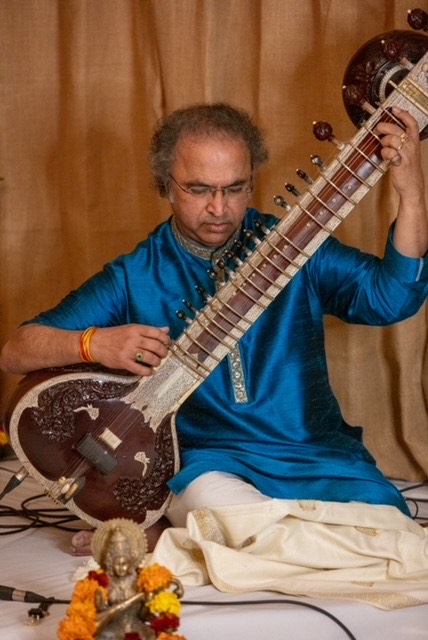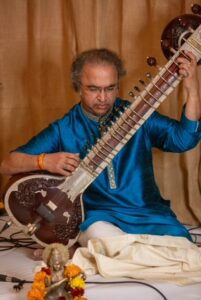Prominent sitar player Shubhendra Rao is ranked amongst the top soloists of India. The press describes him as “a musical bridge to many cultures” and “a thinking musician, constantly endeavouring to carry his instrument beyond conventional boundaries”. His music is an experience that is not aimed at titillating the senses, but to seize the soul.
A protege of Ravi Shankar, he is acknowledged by critics and connoisseurs alike as a worthy successor to his teacher’s tradition. In a candid interview he gives insights about his journey as a musician. Excerpts
Q. You belong to a musical family of legendary Pandit N.R.Rama Rao ji- your father. How much did he influence you initially when you started learning music and later when you grew up?
A. My father Pandit N.R. Rama Rao was perhaps the closest disciple of Pandit Ravi Shankar. He was the first person from South India to take up a North Indian instrument way back in the 1940s and responsible for popularising Sitar and North Indian instrumental music in the South. My mother was a very accomplished Saraswati Veena player and I inherited my musical genes from them. I was even named after my Guru’s son whose name was Shubhendra Shankar. My parents say that I could sing before I could speak.
Q. When did you start learning music?
A. Don’t remember exactly when I started but since both my parents were musicians, there was music at home all the time—Sitar & Saraswati Veena. From what my parents said, I could sing before I could speak.
Q. What drew you to the sitar?
A. The fact that my father played the Sitar, it was perhaps normal that I started playing it from a very young age. I loved the sound of it too.
Q. You have been learning sitar since the age of 4? Did you ever want to play other instruments?
A. If at all, I was attracted to the Saraswati Veena but finally, the call of the Sitar was stronger perhaps.
Q. How many hours did you practice every day during school years?
A. Even during my school years, I always practised 3-4hrs everyday. Later this increased to 5-6hrs and finally, after dropping out of college to focus completely on music, I would practice 12hrs on an average everyday.
Q. How did it affect your studies?
A. I don’t think it affected my studies in any way. Contrary, it perhaps helped develop my focus.
Q. You studied under the Guru-Shishya Parampara – please share a story about that experience.
A. I could write many books on just this topic but having lived it, I can surely say that I wish everyone could learn in this way. A formal school can never give that experience & I hope that more children can learn in the true Guru-Shishya parampara. Of course there are some downsides to it too but the positives far outweigh these few things.
Q. What is your advice to students who want to pursue music?
A. There is no secret—practice, practice & more practice is the only mantra! Learn to love your practice and enjoy the process. Remain a student throughout your life and stay hungry to learn everyday.
Q. Your wife herself is a wonderful musician. How do you both manage to keep such a busy schedule, be innovative & creative and still have time for everything?
A. Saskia is indeed one of the most amazing and creative people I know. Her contribution to Indian music is huge—whether it is introducing a new instrument, her Indian Cello to Indian music or writing the first ever Indian music curriculum for young learners, Sangeet4All. We love our lives together—performing a lot together, composing, traveling. Both of us are passionate about what we do and love it. That is the secret!
Q. Your son is a rising star himself? Tell us a little about him & his journey?
A. Indeed Ishaan is a child prodigy. He learnt both the Sitar and Cello as a child but at a very early age itself, decided he wanted to play an instrument of his own choice. He fell in love with the Piano and has never looked back since. He is hugely creative person who is now studying at Berklee College of Music in Boston. He was recently chosen by Sony Music Group as one the 50 Global Scholars, the only Indian chosen for this recognition and thus is indeed a huge achievement at this early age.
Q. Your recent tours & collaborations?
A. Some of the recent projects that Saskia and I’ve worked are beautiful and creative projects—we worked on the music of Heitor Villa Lobos’s who is one Brazil’s greatest composers, on a beautiful project called Song of Water where we brought together two streams of art together—painting & music. Look forward to composing for an Israeli orchestra that’ll be touring India in April, going to some countries in South America in the summer, to Australia in autumn and of course, concerts in India itself
Q. Having travelled the world, where do you like performing most?
A. There is no such thing as favourite places. Basically wherever we get a good & receptive audience, I love performing for them. I love performing for children when I perform for Spicmacay too.
Q. You have done pure classical and fusion too. What other collaborations are you looking at?
A. I don’t like the word fusion since it’s a very loosely used term. What I would call my experiments are actually pushing the boundaries of Indian classical music which I love too. Whether playing with a Philharmonic orchestra or with Jazz musicians or Chinese musicians or even Aboriginal musicians from Australia, I enjoy the process of learning from them and working closely with them to understand their music better. The one thing that unites people like nothing else does is music because music is indeed the only universal language.
Q. Your initiatives to take music to the next generation?
A. Yes indeed a very important and necessary thing—to give a proper access to the rich cultural heritage. Apart from supporting Spicmacay for over 3 decades now, Saskia & I run our own music foundation & a Pvt Ltd company to take music education to children of all ages. Over 80,000/ children have studied Sangeet4All. We’re collaborating with Tata Steel Foundation to take music education to the tribal children in Odisha in their 1000 school project. We’ll be starting this in Jamshedpur soon. Basically we want to make music the birthright of every child.
Suman Doonga is an educationist and social worker with a passion to preserve and
promote Indian art and culture.







